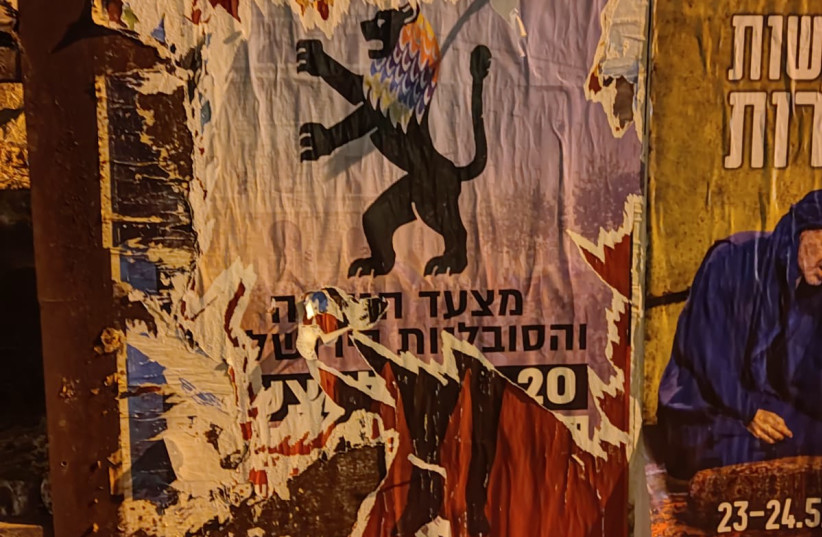Jerusalem's LGBTQ+ community is facing an "emergency situation" in light of the current government, with LGBTQ-phobic incidents being reported dozens of times every day, warned Emuna Klein Barnoy, community director at the Jerusalem Open House for Pride and Tolerance, during a special discussion by the Knesset Public Security Committee on Tuesday.
"We're seeing violence distributed throughout the entire city," said Barnoy. "We're being flooded by reports. The number of reports to the Open House rose from 14 reports per day to 20-25 reports per day. We're collapsing under the workload created by the emergency situation that our community has entered due to current government."
A position paper by the Jerusalem Open House noted that while in the past there were specific hotspots of anti-LGBTQ+ violence, that violence has now spread throughout the capital, with a marked increase of physical violence or threats of physical violence.
Additionally, in the past four months, the Jerusalem Open House has received at least one report per week of an LGBTQ+ individual being kicked out of their home or losing their source of livelihood due to their identity.

77% of LGBTQ+ Israelis do not trust the police to protect them
A survey by the Israeli Institute for Gender and LGBTQ Studies found that a vast majority (86%) of LGBTQ+ Israelis across the country report that their sense of security has deteriorated in the past three months. 77% of the respondents stated that they do not trust the police to protect them.
Barnoy stressed that if the police do not attach importance to seemingly small crimes like tearing down Pride flags and throwing stones, victims of more violent attacks won't feel safe to file complaints with the police.
Barnoy added that many of the assailants who attack LGBTQ+ people also target foreign workers, Ethiopians, the elderly and other groups.
"I would appreciate if [committee chairperson and Otzma Yehudit MK Zvika] Fogel would pass a message from me to National Security Minister Itamar Ben-Gvir that even if he'll never be LGBTQ+ and even if he'll never be Ethiopian , the day will come when he'll be elderly and the people who beat us up on the streets will target him too. If he thinks that if he doesn't deal with it now, it'll be easier to deal with it later, he's mistaken."
Barnoy stressed that the Jerusalem Pride march is coming up on June 1 and that while violence against LGBTQ+ people in Jerusalem always rises around the time of the march, this year an even larger increase in violence is expected.
"Last year, my children didn't leave the house for four days because of threats to their lives because their mother is the organizer of the march," said Barnoy.
During the meeting, Fogel stressed that "sexual orientation and gender identity should not be a reason for abuse by any factor whatsoever."
Police representatives at the committee meeting stressed that the police decide on whether to open or continue an investigation based on the severity of the case, the degree of damage and the possibility of being able to complete the investigation and gather enough evidence. The representatives stressed that when lives are in danger, the identity or the location of the victim does not affect the police's decision to act.
According to police data, seven investigations have been opened in cases concerning crimes committed due to an anti-LGBTQ+ motive. Two of the cases are being processed by the prosecutor's office, four are under investigation and one has been closed.
Police officer Racheli Tzimber noted that the police conducted over 140 lectures and training sessions for police officers on the subject of the LGBT+ community.
The discussion on Wednesday was called after MK Meirav Cohen requested a discussion on the matter after a series of LGBTQ-phobic attacks were reported throughout the country in recent weeks.
The reported attacks include cases of LGBTQ+ Israelis being chased by teenagers, pro-judicial reform protesters assailing a young woman carrying a Pride flag, Pride flags being torn down in Tel Aviv, rocks being thrown at the windows of apartments with Pride flags and LGBTQ+ people throughout the country receiving threats to their lives.
According to the Agudah - The Association for LGBTQ Equality in Israel, in March there was a four-fold increase in LGBTQ-phobic incidents compared to last March.
3,309 cases of LGBTQ-phobia were reported in 2022, an 11% increase compared to the previous year. There was a seven-fold increase in the number of LGBTQ-phobic incidents involving public figures and the media, a five-fold increase in the number of LGBTQ-phobic incidents in public places and an eight-fold increase in cases of discrimination at businesses.
A number of members of the current coalition have campaigned against the LGBTQ+ community, including Ben-Gvir, multiple members of the Religious Zionist party and Noam Party head Avi Maoz, among others.
Last week, Maoz issued an official statement saying he was "filled with shame and pain" after Knesset Speaker Amir Ohana, a gay, married man, was allowed to speak at state ceremonies.
Heritage Minister Amichai Eliyahu, a member of Fogel's party, wrote an op-ed in 2018 about "LGBTQ+ terrorism - its main characteristics and how to fight it." Eliyahu stressed in the op-ed that "it is difficult to understand how activist organizations were able to take what was medically defined as a disease, what goes against the most basic nature of humanity - and turn it into an international norm."
Ben-Gvir has a history of anti-LGBTQ+ statements, including taking part in the "Beast Parade," in which goats and donkeys were paraded in Jerusalem in protest against the Pride march in 2006. Ben-Gvir has since expressed regret for his statements, although he does still oppose Pride parades as "provocations."
